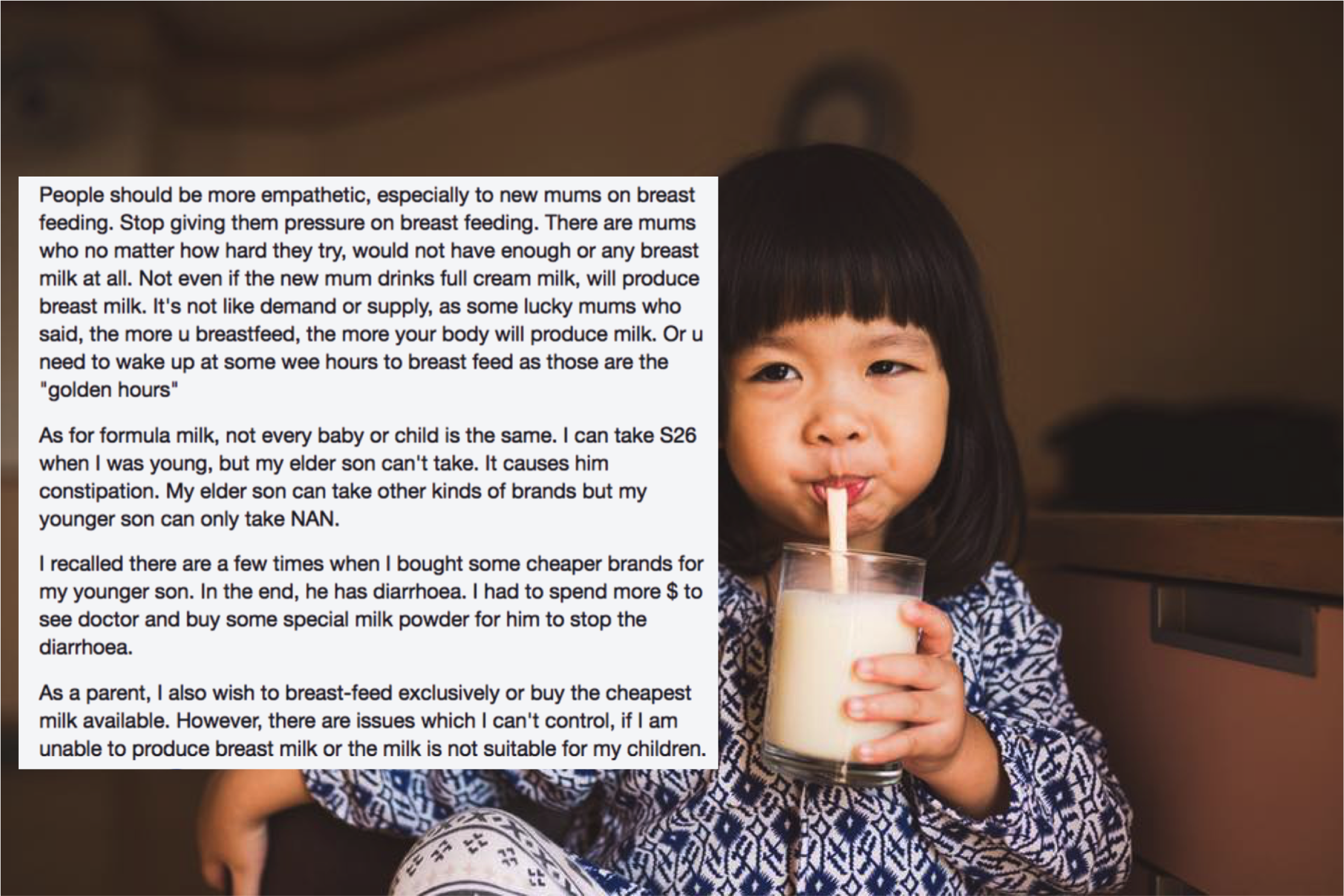As you might know, the topic of milk powder and its crazy high cost — as well as the crazy cost disparity between brands — has come up for debate in the recent parliamentary session.
In fact, it's possibly the only thing you might remember from the most recent parliamentary session.
So on Saturday, Minister in the Prime Minister's Office and resident government baby-making activist Josephine Teo took to Facebook with the following post on milk formula:
Among other things, she touched on the feeding of babies and young children with milk, and made the following two points:
1)"Breastmilk is best", and parents are encouraged to breastfeed for the first year at least, after which milk powder isn't actually even needed.
Consequently, she added, the government will initiate more public education and a bigger push into advocating breastfeeding.
2) Milk is milk, no matter how fancy the marketing, and the kids will adjust given enough time and encouragement.
She said the relevant government agencies will look into revising guidelines and regulations on advertising, import and labelling of infant milk formula.
It's really not that simple, though.
So there are two problems with these two points, and parents noticed them right away, with many tackling both at the same time in their comments.
On infant formula:
The beef some parents have with the "milk is milk" argument is it's not about the fact that expensive is better, or specific brands. It's all about suitability for their children — can they even stomach it to begin with?
The top part of the comment is censored as it doesn't relate directly to the point this person is making — it was in response to another post above:
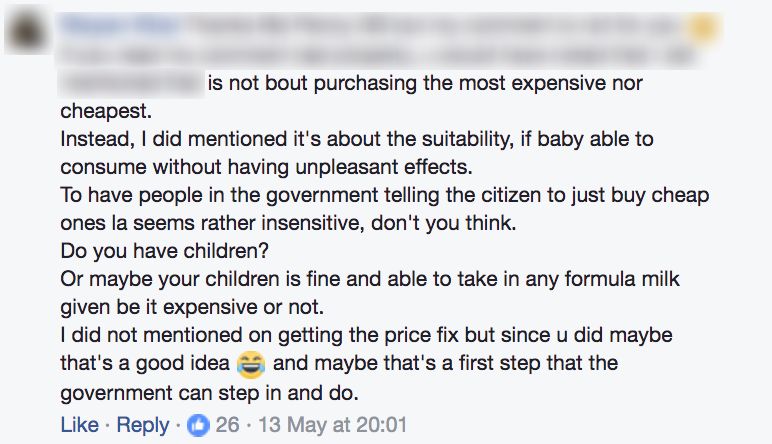 Screenshot from Josephine Teo's Facebook post
Screenshot from Josephine Teo's Facebook post
If one can take Brand A but the second one cannot, then how? Wait for them to adjust?
 Screenshot from Josephine Teo's Facebook post
Screenshot from Josephine Teo's Facebook post
How long and how intense should one's adjustment period be, too — should it comprise constipation, diarrhoea and stomach upsets?
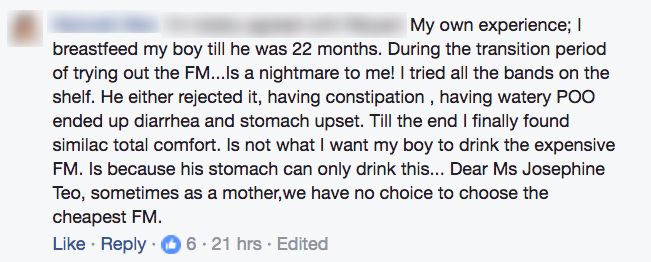 Screenshot from Josephine Teo's Facebook post
Screenshot from Josephine Teo's Facebook post
Again, many babies are different and have different needs:
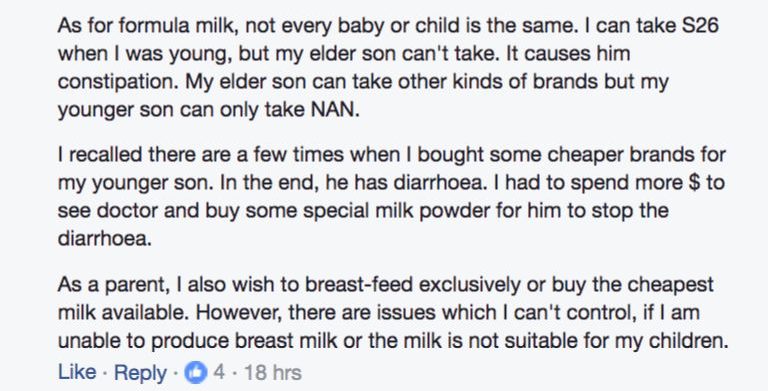 Screenshot from Josephine Teos Facebook post
Screenshot from Josephine Teos Facebook post
On breastfeeding:
There's no way Teo doesn't know this — that there are moms who simply can't express breastmilk for their babies. Some have very little, some have none at all. And there is already enough personal baggage to feel this way without anyone else saying anything to them about it.
The fact is it doesn't matter how much or how little milk a mom can produce for her children, and it's perfectly okay even if a mom can't and has to rely completely on formula for her babies.
And many pointed this out:
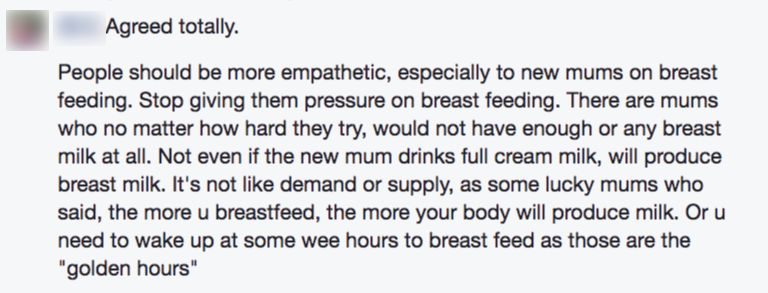 Screenshot from Josephine Teo's Facebook post
Screenshot from Josephine Teo's Facebook post
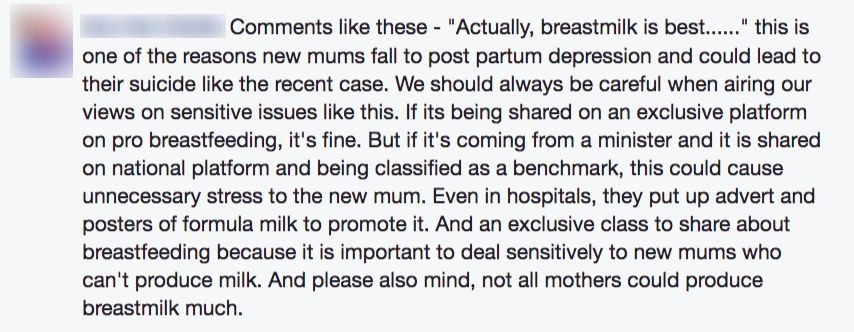 Screenshot from Josephine Teo's Facebook post
Screenshot from Josephine Teo's Facebook post
This mom, for instance, didn't have enough breastmilk for her triplets, turned to buying formula from JB, and even switched to fresh milk, like Teo suggested:
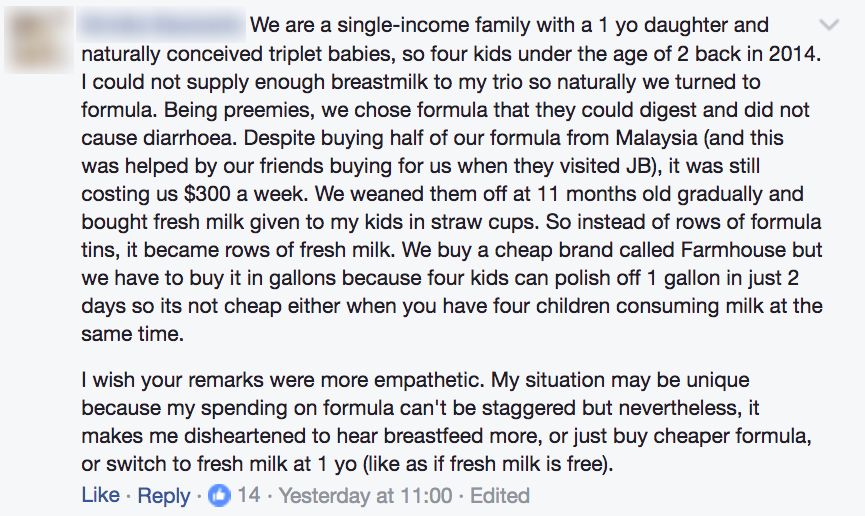 Screenshot from Josephine Teo's Facebook post
Screenshot from Josephine Teo's Facebook post
And this mom who had trouble breastfeeding said her baby could tell the difference between milk bought in JB and milk purchased here:
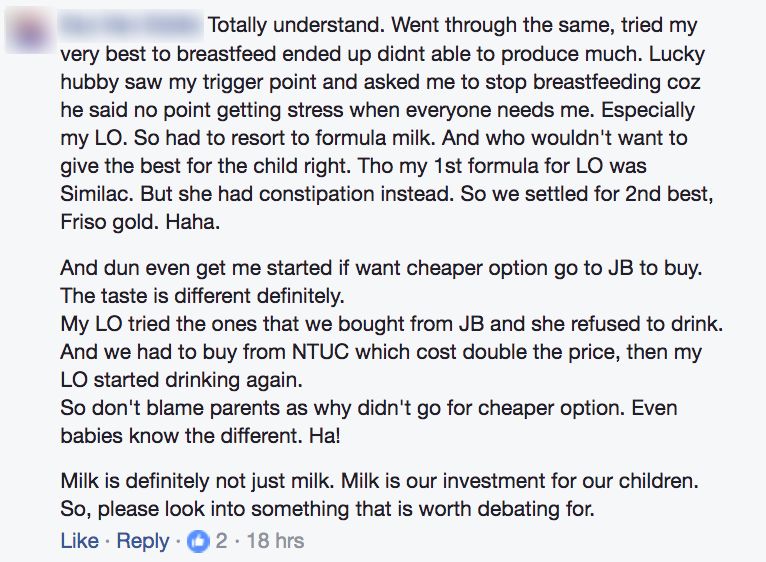 Screenshot from Josephine Teo's Facebook post
Screenshot from Josephine Teo's Facebook post
On the Competition Commission's study into infant milk powder price inflation:
Teo spoke quite briefly about this, mentioning that the key factor they found was an aggressive push and channelling of resources into marketing and advertising activities in order to strengthen perception that "more expensive means better".
We had a look into the CCS's press release, which covers quite comprehensively the ways the larger companies cemented their leading position, leading to "non-price competition" (i.e. the crazy inflation of prices) as compared to price competition (keeping prices low to stay competitive). These include:
- The knowledge that parents mostly don't switch formula unless there's a medical reason for it (hence, lower prices would not attract a parent to switch brands as easily as in other products)
- Investing heavily in research and development to create ingredients that contribute to attributes desired by parents (e.g. "Intestinal Quality", with a bear wearing a graduation cap)
- Sponsoring milk to hospitals so that families will stick with the brands they started out with for their babies from infancy (because if it works, why switch, right?)
Just to name a few. But these all contribute to the crazy prices. In terms of differentials between brands, this isn't specifically elaborated on, even in CCS's full report.
So here are some things we hope the government can consider in their plans regarding this:
- The issue of the prices of formula milk isn't as straightforward as choosing the cheapest brand. The fact is it's not that simple, and shouldn't be simplified, because you're being insensitive and dismissive in doing so.
- Breastfeeding is a very sensitive and tricky issue, as evidenced by the recent tragedy of a young mother who committed suicide with her two-month-old infant after feeling too much pressure. So sensitivity is key here, in any campaigning or public communication planned, even more so than in dealing with infant formula prices.
- If you're going to advocate breastfeeding, please make sure the places where young moms work (and the people they work for) are as accommodating and conducive to and for this as well.
Your turn please, Minister Teo.
Here's an article you should check out:
We cycled through 700 years of Singapore history just to write this article
The price of this whiskey that S’pore helped develop really got no chill
Related article:
Milk powder price hikes not due to anti-competitive behaviour, says Koh Poh Koon
Top photo adapted from Josephine Teo's Facebook page
If you like what you read, follow us on Facebook and Twitter to get the latest updates.
